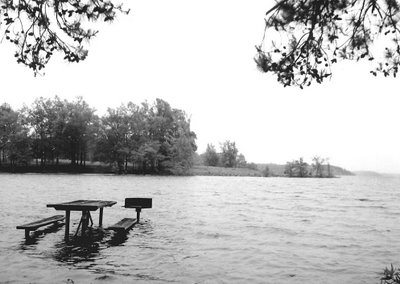
The town I used to work in blew up yesterday. Well, the whole town didn’t blow up, just a hazardous materials facility in the middle of it, which sent a plume of toxic fume into the air and some 17,000 people had to be evacuated. You probably saw it on
the news -- it happened in Apex, North Carolina, a once small town turned suburb of Raleigh.
The mayor was on TV, calling it the worst disaster in the town’s history, which is a pretty serious comment, considering the entire downtown
burned to the ground in 1912. I recall an old man talking about how they thought they might be able to save his father’s general store, “but when that black powder caught,” it was all over.
A single burning building might not seem comparable to losing an entire downtown, but then again, this building supposedly stored
toxic and dangerous chemicals that don’t react too well when exposed to the human lungs. Apparently, the release of such chemicals into the immediate environment could also be a serious concern -- what goes up must come down -- and the rain that followed on Friday will run whatever was released right back into the water table.
You know how they always tell you not to pour your used grease, motor oil, or other substances down the drain? Well that stuff eventually works its way back to the reservoir where people and fish and birds and deer get their drinking water from, or it seeps down into area wells. The release of hazardous chemicals works the same way. It gets into the air, attaching itself to dust particles and whatnot, then falls or is rained down onto the ground, settling on fences and cars and houses, and trees and people, and every where else. The rain helps keep it out of the air and out of your lungs, of course, which is very good, but it’ll probably concentrate any contamination to certain places, which could be bad as well.
It all really depends on what was being stored (the paper said industrial wastes including paints, solvents, pesticides and weed killer) at the facility and of that, what was turned into smoke. One of the biggest hazards of smoking cigarettes is not the tobacco itself -- I mean to say, tobacco is bad for you, but that’s not all that’s bad for you -- but the combustion of materials within the cigarette that the human lung was never designed to accommodate. Cigs are
chock full of preservatives like formaldehyde, and agents to boost “flavor” like cyanide and the stuff they use to make battery acid. Those, and the bleached white paper that burns while you smoke it can be downright caustic.
So, any building fire can have the same immediate effect. The chemical reaction caused by the intense heat and fire releases bits of all sorts of toxic fumes into the air even in a normal building fire -- but when you add mass quantities of, say, pesticides into the mix, it could be extra dangerous. They’re not saying yet, but according to the news, nobody seemed to have been
seriously hurt yet.
So anyways, the whole time I’m watching this on the news, you know what I’m thinking? That I wish I could be there. I was a reporter, you see, for the
Apex Herald newspaper, a weekly covering the town and a little of the surrounding county, from 1995-1999. Leaving that job for a better one is what got me to buying a house in
Louisburg. The better job didn’t work out, and eventually, after dabbling in some corporate work here and there, it got me to where I am now --
unemployed.
So I’m watching the coverage on TV, all the while my mind is racing to think of what I’d be doing if I were there. The interviews I’d conduct, the people I’d consult, the residents I’d speak to, the photos I’d take, the questions I’d ask the mayor during the press conference he gave. And then the information I’d get from the town manager, his assistant, or perhaps the planning director, that the mayor doesn’t have a clue about.
Something I’ve noticed about the daily papers -- is they always want to speak to the mayors of the towns affected during any big issue. Town blows up? Call the mayor. New business opening up? Call the mayor. When I was a reporter I never went to the mayor for information. Even a guy like
Keith Weatherly who has been mayor in Apex for nigh on 10 years, and commissioner before that, and who must know a heck of a lot about his town -- it wouldn’t even have crossed my mind to go to him for anything other than a feel good comment. I mean, when you really want to learn about something, why go to a politician for information? I’ve never understood it.
It’s exciting to be a reporter, especially during times of conflict, or disaster. It’s what you live for. Plus, if you do any even decent coverage at all during such times, you’re a shoo-in for some kind of press award. It’s no secret that the trials and triumphs of the human spirit are what bring one the little recognition that you can get as a weekly newspaper journalist. But more than that, just being in the thick of it -- the tension, the apprehension, the dangers, the excitement of it, really, is like
juice to the blood of the journalist. We live for those things.
So for a few moments, I get to run the investigation, beat the street with my feet, bump elbows with the daily and national press, muscling room for a better photo, call all my contacts, stand at ground zero of the blast, seeing, smelling, feeling the story seep into my bones, then spend all night and several weekend days pounding all that raw data out into a story, two stories, three, four, editing them, calling for confirmation, reviewing the pictures, choosing the ones for the most impact and poignancy, perhaps throwing them together for a picture page, perhaps spreading them all over the front page, and then watching it go to press, taking a half-day breather, and then starting all over again next week.
For a few moments, in my mind, I felt the journalist again. Then I switched off the TV.
On Monday I go back to work at a temp job.















